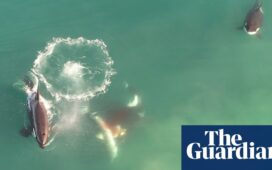
Fertility troubles are a common stressor for couples, and it seems that penguins are no exception.
A ten-year study found that although they do often ‘mate for life’, like humans, this doesn’t stop individuals from looking elsewhere.
Researchers found that ‘divorce’ was relatively common in the colony of Little penguins they studied on Philip Island over 13 breeding seasons.
The secret love lives of the cute birds showed them to be a bunch of cheating wife-swappers, which just goes to show.
Splits were more common after a disappointing year for hatching young, suggesting that one or both of the pair decided to try their luck at becoming parents with someone else.
Study author Richard Reina, of Monash University, said: ‘In good times, they largely stick with their partners, although there’s often a bit of hanky-panky happening on the side.’

‘However, after a poor reproductive season they may try to find a new partner for the next season to increase their breeding success.’
The sand may look softer on the other side, but the stats are rarely in their favour.
Overall breeding success in seasons after more penguins ditched their partners was lower, indicating the plan of leaving for a bigger flock of chicks didn’t really pan out.
The study in Ecology and Evolution found that penguins are unexpectedly perfidious.
Of around a thousand pairs studied, there were 250 ‘divorces’ after ten years, while others were ‘widowed’.

For context, in the latest Census data, only one in five Brits who got married in 2012 were divorced within ten years (though admittedly, penguins have a significantly shorter lifespan).
Penguins were classified as divorced if their partner from the prior breeding season reappeared in the colony but with a new mate.
Why is divorce bad for penguins?
It’s not just moaning about penguins’ moral decline.
While divorcing may allow individual penguins to find a ‘higher quality’ mate, if lots of couples split up at the same time it’s not great.
This is because time is lost on ‘mate-searching and courtship’ meaning reproduction is delayed or even prevented entirely, the scientists theorised.
‘Furthermore, this may force parents to forage for their chicks during times of poorer food availability because of the delay in beginning reproduction caused by having to spend time finding a new mate.’
Scientists said knowing about the negative affects of divorce on penguins is important for their conservation, and should be considered alongside habitat stresses when predicting population trends.
Get in touch with our news team by emailing us at webnews@metro.co.uk.
For more stories like this, check our news page.
MORE: Kate Winslet reveals her most irrational fear of farm animal
MORE: Boots expands babywear with character clothing collection featuring Peppa Pig and more












